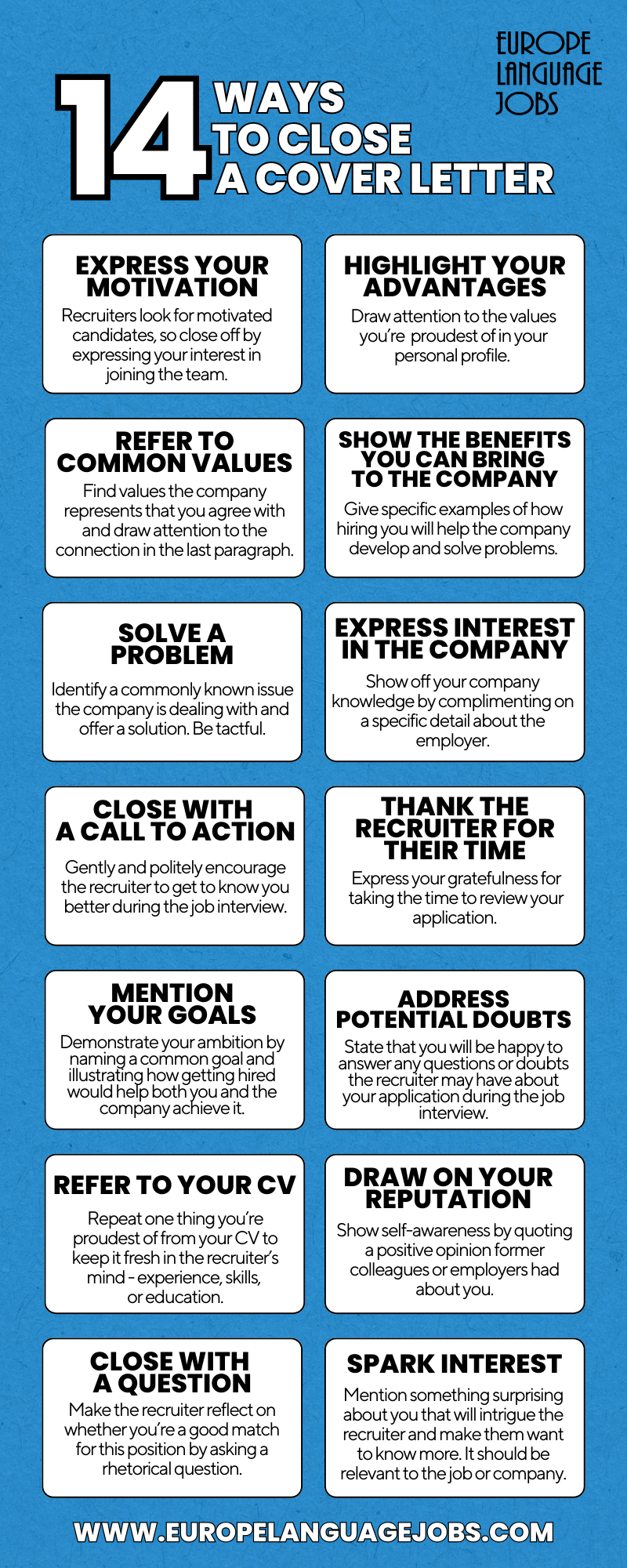Your cover letter represents you. It is your chance to wow the recruiter and convince them to invite you to an interview.
Needless to say, your cover letter must be strong. It has to grip the attention of the recruiter with its opening, hold it throughout the main body, and leave a lasting impression with its closing.
Arguably, the closing of a cover letter is one of the most important elements of the document. It needs to stand out, drive your point home, and make the recruiter remember you.
In this article, we will show you how to close a cover letter. Read on for 14 ways to do it with examples.

How to close a cover letter?
- Express your motivation
- Highlight your advantages
- Refer to common values
- Show the benefits you can bring to the company
- Solve a problem
- Express your interest in the company
- Close with a call to action
- Thank the recruiter for their work and time
- Mention your goals
- Address potential doubts
- Refer to your CV
- Draw on your reputation
- Close with a question
- Spark interest in the recruiter
1. Express your motivation
Recruiters look for motivated candidates. They want to know that the person they hire is genuinely excited about the job and that the application isn’t just one of many for you (even if it is).
Suppose you close your cover letter with a line about how you look forward to becoming a part of the team and hope for a chance to introduce yourself properly at the job interview. In that case, the recruiter will remember you as a positive, motivated person.
Becoming a part of your team would be a highly valuable experience for me. I hope to get a chance to reveal more about my skills and experience during the interview.
2. Highlight your advantages
If you are particularly proud of your skillset, you may want that to be what the recruiter remembers about you. In that case, you can close off with a short summary of your values.
Remember to factor in your skills concisely, but not arrogantly. You want to demonstrate them without sounding like a show-off.
I would love to receive the opportunity to further demonstrate my personal profile during the interview. I am sure that my extensive work experience and relevant skillset make me a good match for this position and company.
3. Refer to common values
Personality hires are becoming more and more popular. Companies are shifting their approach and focusing on the values and personality of candidates, as well as their skills and experience.
Additionally, being familiar with the values represented by the company will prove to the recruiter that you have done your research about a potential new workplace. It is an important step, which shows dedication and expresses a real interest in joining the team.
I would love to become part of a company that believes in the same values as I do. Transparency, diversity, and social awareness are important to me in both my personal and professional life, and I would appreciate the opportunity to work in a team which represents the same beliefs.
4. Show the benefits you can bring the company
A vacancy is a problem. A good hire is a solution.
The role of a cover letter is to prove that you are a potential good hire. You can do that by showing exactly how you can contribute to the company’s growth.
Think about how you will use your skills to bring tangible benefits. It must be relevant to the company’s profile and sound both attractive and realistic.
I am confident that my language and communication skills will allow me to perform in the role of Sales Representative with Spanish with excellent results. I look forward to generating new, valuable leads for the company and contributing to its growth by regularly driving in sales.
5. Solve a problem
You should do your research about a company before sending your application. First, to be able to tailor your application to the employer’s specific needs, and second, to decide if the workplace is a good match for you.
During your research, you might find out that the company is dealing with some specific problems. You can gently address them in your cover letter to show that you may have a solution for them.
If you choose this way to close a cover letter, you have to be very careful. You don’t want the recruiter to feel like you’re poking at the company’s weaknesses.
Also, only address issues that are part of public knowledge. If you did some real digging and found out about issues an average person wouldn’t know about, this could be perceived as a violation of privacy.
My financial analysis has helped my previous employer lower expenses by 2.5% and diversify the company’s sources of income. I am positive that using my extensive experience, I can find new ways to decrease costs and identify opportunities for new investments in [x] company.
6. Express your interest in the company
This way to close a cover letter is your way to shine and show off your company knowledge.
Find specific elements you genuinely appreciate about the potential employer and aspects that make you want to be part of that workplace. Then, mention them in your cover letter with a personal reference.
I have always admired the way [name of company] executes its marketing campaigns. The use of the storytelling technique is inspiring, and the TV commercials always evoke emotions in me and everyone I know. I would love to contribute to developing fresh ideas for future campaigns and build a strong emotional connection with the target audience as the Marketing Director.
7. Close with a call to action
You may be familiar with the term call to action (CTA). You see them in every newsletter you receive or hear them at the end of every TV or radio commercial.
A CTA is meant toconvince the recipient to take specific action. The action you want a recruiter to take is to invite you to an interview.
Encourage them to do so with a call to action that is subtle but to the point.
I am confident that my relevant experience and extensive skillset make me a good fit for the position of [name of the position]. I would be grateful for an opportunity to demonstrate my personal profile in more detail during the job interview.
8. Thank the recruiter for their work and time
Recruiters are busy people. Hiring new talent is just a part of their jobs, and their daily to-do lists stretch way beyond reading CVs and conducting interviews.
At the same time, many recruiters don’t feel appreciated for their workload. Thanking them for their time could put you in their good graces and make them remember you positively.
Thank you for reading my CV and cover letter. Your time is valuable, and I appreciate that you analysed my application with care. I would love an opportunity to share more about my experience and skills during a job interview.
9. Mention your goals
The perfect candidate for every position is ambitious and motivated.You can demonstrate those traits by stating your professional goals and explaining how you’d like to achieve them with your new role at the company.
This way to close a cover letter will also get you bonus points for proving that you’re thinking about staying in the company long-term. If you say that you’d like to achieve a specific thing in a few years, the recruiter will know that you are serious about the job and don’t consider it just a stepping stone in your career.
My main professional goal is to hold a managerial position within the next 3 years. I am confident that with my motivation and the generous promotion programme offered by the company, I will be able to achieve that goal and contribute to the company’s growth with even more impact.
10. Address potential doubts
It takes an experienced recruiter 6 to 7 seconds to form a first impression of you based on your CV. If they reach for your cover letter, it means that their initial opinion of you has been positive so far.
The job of your cover letter is to retain that opinion and elevate it further. However, it may happen that after reading your application, a recruiter still has some doubts or questions.
A good way to close your cover letter is to let them know that you are happy to provide further explanation or elaborate on the contents of the documents during a face-to-face conversation.
Thank you for taking the time to read my CV and cover letter. I would love to answer any doubts or questions you may have regarding my application during the job interview.
11. Refer to your CV
Your cover letter shouldn’t be a repetition of your CV. They should be concise, yes. But the role of the cover letter is to expand on the information included in the CV and provide some additional details.
Still, those documents come together, so you can close your cover letter by referring to a specific part of your CV.
Make a smooth connection to the element of your CV you are proudest of. This can be the experience section, certifications, or skills.
As stated in my CV, I am a hard worker with strong communication skills and the ability to work under pressure. I am confident that my experience in [x] will allow me to deliver an excellent performance as [name of position].
12. Draw on your reputation
One of the most common interview questions is “How would your colleagues describe you?”. Recruiters ask it to judge your ability to self-reflect, as well as your awareness of what your relationship with coworkers looks like.
You may have heard the saying “your reputation precedes you”. Well, you can precede that question by choosing this way to close a cover letter. Refer to somebody else’s honest opinion about you that you’re proud of and would like to share with a potential employer.
My colleagues/my previous employers often told me I am very reliable and hard-working. I am positive that this, together with my other traits and relevant experience, would make me a valuable addition to the team.
13. Close with a question
A rhetorical question is another stylistic device to close a cover letter with. Where a call to action is supposed to encourage the reader to take a specific action, a question provokes reflection on a certain topic.
A well-formed question will make the recruiter subconsciously answer it - and, who knows, they might come to a realisation that you’re the right candidate for the job.
Do you believe that my experience and skill set make me a good addition to the team? If so, I would love to discuss my personal profile further during the job interview.
14. Spark interest in the recruiter
An effective but risky method to close a cover letter is to catch the recruiter off-guard.
You can use something surprising about you to intrigue them and make them want to find out more. Ideally, pick a trait or a hobby that is relevant to the job you’re applying for.
If it’s not directly relevant, find a link between your fun fact and the job or company.
In my free time, I am an avid fan of extreme sports. Activities such as windsurfing or skiing supply me with valuable traits such as patience, diligence, and risk assessment. I would love to explain how my hobbies find their reflection in my professional life during the job interview.
How to sign off a cover letter?
Just like every letter, a cover letter must be signed at the bottom. The signature itself should be done by hand - never printed. A digital version of your real signature is fine, as long as it looks tidy once you insert it into the document.
A cover letter is a formal document, so you can use phrases such as:
-
Respectfully,
-
Sincerely,
-
Kind regards,
-
With best regards,
-
Thank you for your consideration,
Avoid unprofessional phrases such as:
-
Thanks,
-
Cheers,
-
Best (too short and straightforward, “best regards” is a better choice),
-
Have a good day,
-
Have a good one!
How not to close a cover letter?
A cover letter is a professional document, which means it also needs to sound professional. Here are some things to avoid when writing a cover letter:
1. Being pushy
The goal is to sound motivated without seeming desperate. You don’t want the recruiter to feel cornered, or to get the impression that you are outright begging them to choose you.
I assure you that I am a valuable candidate who will be a great match for your team. So please, invite me to the interview and find out more about me.
2. Sounding arrogant or overly confident
In stressful situations, confidence can easily turn into bravado. The latter isn’t a good trait in a cover letter, as it can be interpreted as false confidence or even make you seem haughty.
My CV and cover letter leave no doubt that I am the perfect candidate for this position. Not inviting me to an interview would be a mistake, so I look forward to receiving your call.
3. Writing too vaguely and generically
Just like you must tailor your CV for every application, you should write a fresh cover letter for every job. Even if the positions you apply for are similar, the companies will be different.
Plus, skilled recruiters can spot a generic cover letter from a mile away. And a candidate with a generic cover letter won’t be their first choice.
So, if you have been using the same cover letter with changed details so far, now is the time to change it.
Remember to also refer to specific skills, goals, and aspects of the job. Provide numerical data for all your achievements that can be measured and show exactly how you can contribute to the company’s development if you are hired.
4. Grammar or spelling mistakes and typos
This doesn’t refer to just the way you close a cover letter, but how you write it in general. Grammar or spelling mistakes and typos suggest sloppiness and a lack of attention to detail.
They are true pet peeves for recruiters, who may think that you didn’t take enough care and time to write your application. If you expect a recruiter to carefully read your cover letter, it’s only fair if you dedicate the same dedication to writing it.
5. Colloquial language
Remember that a cover letter is a formal document. Use formal language and address the recruiter with respect.
Here are 14 ways to close a cover letter. You can choose whichever seems the most appealing to you, but make sure it is polite and consistent with the rest of the text.
Keep in mind what to avoid when writing and closing a cover letter and remember to remain professional. You only get one chance to make a first impression, and you want it to be a good one.
Feeling inspired? Visit our blog for more career advice! How can you be sure the information we provide is top-notch? We are a group of professionals working with recruiters, career coaches, and HR specialists from all over the world!
Trust our experience and let us help you find a new job in Europe!



















Gottfried Schmer1y ago
Lots of helpful advise.
Lots of helpful advise.